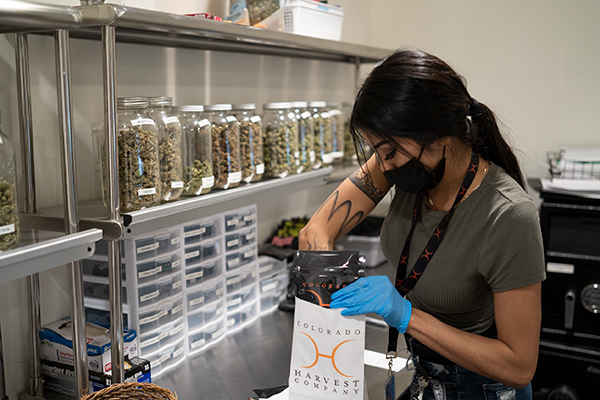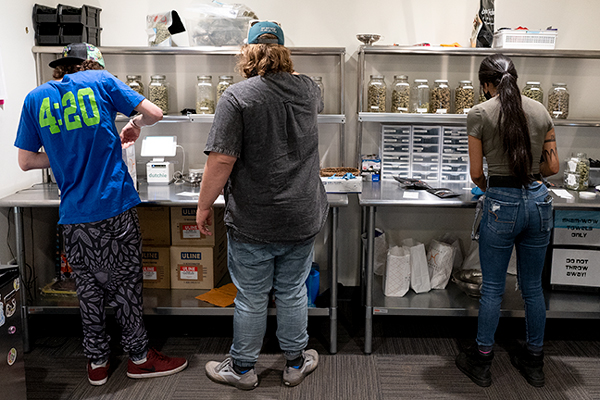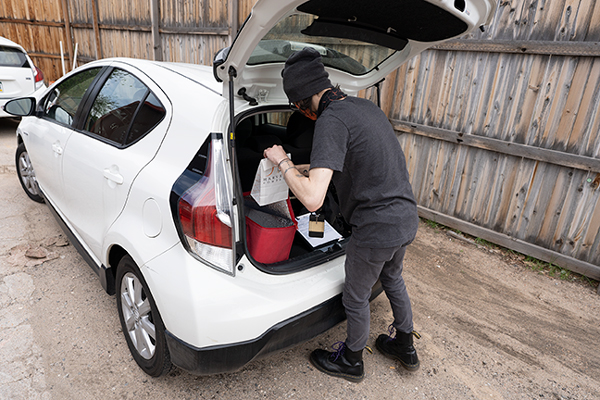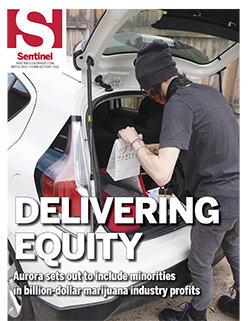
Photo by PHILIP B. POSTON/Sentinel Colorado
Aurora officials are on the cusp of awarding the first transporter permits for so-called social equity candidates seeking to deliver marijuana in the city, pushing the state’s third-largest burg further onto the bleeding edge of pot policy in the state.
Robin Peterson, manager of the city’s Marijuana Enforcement Division, said she plans to award a pair of social equity transporter permits later this week, allowing the applicants to ferry marijuana on behalf of licensed retail proprietors in the city under an ordinance that went into effect earlier this year. The permits will be the first of their kind issued by a municipality in the state.
“The idea is to get them into the industry,” Peterson said of the new applicants. “Back when we did this, at least in my experience, for retail it was all people who had the money and who could do it. This is a way for (social equity candidates) to dip their toe into the industry, and I have to say they’ve done real well. They’ve put a lot of work into all this.”
She said she has five additional social-equity candidates currently working their way through the permitting and licensure process, and four additional pot shops that have applied to provide their own delivery services. Three stores — Colorado Harvest Company, Terrapin Care Station and The Green Solution — have been approved to deliver their product to Aurora residents in recent weeks. At Colorado Harvest’s location on East Yale Avenue, workers are now running up to 50 deliveries a day across Aurora, according the company’s founder and CEO Tim Cullen.
Peter Marcus, a spokesperson for Terrapin Care Station, said that he hopes delivery will be a boon to mid-sized cannabis retailers. Some larger marijuana retailers were concerned about the rollout because their entire model is based around brick and mortar sales, he said. But delivery could help level the playing field for smaller stores.
“It creates more of a free market, more opportunity for cannabis companies to get their product out,” Marcus said of delivery. “We do see the potential as being enormous.”
The pandemic saw a spike in delivery and takeout as people moved away from indoor shopping and dining, including finally being able to order alcohol to go. Marcus hopes the interest in delivery will stick around for cannabis.
“People have sort of been trained to move towards those kinds of services,” he said.
Terrapin is working with High Demand Delivery as its social equity partner, which will be in charge of making deliveries.
Sarah Woodson, one of High Demand Delivery’s owners, said that the business will make veterans and people of color a priority when hiring delivery drivers, and sees the role as an entry point into the cannabis business.
She praised Terrapin for being the first to outsource delivery to a social equity partner instead of trying to figure it out in-house.
“In order for social equity to work, there has to be a collaborative relationship between dispensary owners and delivery,” she said.

Photo by PHILIP B. POSTON/Sentinel Colorado
The deliveries will be discreet and perfect for people who know exactly what they want and don’t need to go into a store as well as for people who might not feel comfortable going into a dispensary, she said.
Aurora recently became the first in the state to allow business-to-consumer marijuana delivery and has since magnetized eyeballs as other municipalities follow suit. Denver is slated to roll out its own delivery system July 1. Under the current city codes, marijuana products can be delivered to other cities that approve recreational delivery and vice versa.
“A lot of other cities have watched pretty closely what we did,” said Curtis Gardner, an at-large Aurora city council person who currently serves as chairman of the city policy committee that deals with mairjuana issues. “We’re the trailblazers with that, and I think that’s exciting.”
In Aurora, recreational marijuana can be delivered to homes between 8 a.m. and 10 p.m by licensed dispensaries, though the city still outlaws medical marijuana sales. Deliveries are capped at one ounce of marijuana, eight grams of marijuana concentrate and 80 ten milligram servings of THC per business day.
The social equity component of the city’s new system has dovetailed with similar efforts at the state level designed to get minority workers into an industry that is overwhelmingly white.
About 86% of licensed marijuana business owners in the state are white, according to demographic data compiled by the state Department of Revenue. Of the some 1,500 business owners who participated in an April survey, 213 reported identifying as Asian, Black, Latino, mixed race, Native American or Native Hawaiian.
About 69% of the nearly 16,500 marijuana employees who filled out the survey identified as white, though that data is largely incomplete as 24,300 additional employees did not disclose their race.
States, including Colorado, are making progress toward a more diverse marijuana industry but so far the push for social equity has been plagued with years of delays and litigation, said Karen O’Keefe, director of state policies at the Marijuana Policy Project. So far, the goals to broaden diversity in cannabis boardrooms, retail shops, production plants and greenhouses have far outstripped realities.
And disappointment with the slow rollout of equity programs has taken on a deeper resonance at a time when the nation is undergoing a racial reckoning, brought on by cases of police brutality and punctuated last year by the death of George Floyd in Minneapolis.
In some cases, aspiring social equity licensees have been locked up again, this time in predatory contracts, with profits and control largely in the hands of investors. In others, they’ve been overmatched in a cutthroat market dominated by international companies valued at millions and sometimes billions of dollars.
Despite a spurt of recent Colorado legislation intended to spur equity among the marijuana realm, states themselves have been slow to establish and grow programs.
Colorado’s program, which took effect at the beginning of the year, is open to all races, but the state Marijuana Enforcement Division says on its website the goal is to increase diversity, especially among owners. It also acknowledges “the effects of decades of criminal enforcement of marijuana laws on communities of color.”
I was happy to see that we were able to include a social equity component in our final ordinance because I do think it goes toward addressing the historical issues around marijuana prohibition. I think this works toward correcting that. — Aurora City Councilperson Curtis Gardner
According to a 2020 study by the American Civil Liberties Union, Black people in the United States are nearly four times more likely than white people to be arrested for marijuana possession, despite comparable usage. The study analyzed marijuana possession arrests from 2010 to 2018.
The Colorado program is open to those who lived in the state for at least 15 years between 1980 and 2010 in an opportunity zone or an area disproportionately affected by drug laws, which is determined by education and poverty levels, unemployment rates and the number of people who receive public assistance. The program also is open to those with a household income below 50% of the state’s median and those who either were or have a close family member arrested or convicted of a marijuana offense.
Multiple opportunity zones are in Aurora, including the East Colfax corridor west of Interstate 225 and a swath south of Denver International Airport in Adams County.
The state rules currently mirror Aurora’s qualifications for social equity transporters, though city council members passed additional exclusionary language in the delivery ordinance that was formally enacted in late January. Social equity candidates and current store owners will be the only people allowed to apply to be marijuana transporters for the next three years, and social equity candidates receive a break on application fees. A transporter license and delivery permit for an equity candidate runs $700, Peterson said, whereas a licensed retail store has to fork over four times that amount.
Aurora Council Member Gardner said council members looked at a variety of social equity proposals when considering the recent ordinance, but he’s satisfied with the final language.
“I was happy to see that we were able to include a social equity component in our final ordinance because I do think it goes toward addressing the historical issues around marijuana prohibition,” he said. “I think this works toward correcting that.”

Photo by PHILIP B. POSTON/Sentinel Colorado
But the seven-year gap between marijuana legalization and the installation of social equity programs in state and local government has proven problematic, according to Woodson, who is also the executive director of the advocacy group The Color of Cannabis.
“Once it becomes regulated, (they) literally should be the first people that have an opportunity to legitimize and capitalize from that business,” said Woodson, referring to people with marijuana convictions.
Woodson’s husband, 39-year-old Terrence Hewing, recently became one of only a few Black entrepreneurs to receive a business license in Colorado’s recreational marijuana industry. His goal is to run a company that delivers the very substance that stained his record.
In 2007, police officers found about a pound of marijuana inside a delivery vehicle Hewing was driving for work. That led to a couple of days in jail, thousands of dollars in legal fees and a felony conviction for drug possession. Hewing lost his job and, because of his criminal record, for years struggled to find housing and a stable, well-paying career.
“I felt like I was in a certain box in society,” he said. “There’s people that don’t have felonies and people that do. It makes you almost feel kind of outcast.”
As many like Woodson and Hewing look for answers to increase minority participation in the business, a recurring question has emerged: Do equity programs do enough to help license holders who may have little, if any, business experience or access to capital needed to launch a successful company?
In an effort to address those potential gaps in acumen, Woodson’s group, anchored in the historically Black neighborhood of Five Points, runs a 10-week business course to help students navigate the social equity application process and to connect them with industry leaders.
Michael Diaz-Rivera, 35, who identifies as white, Black and Puerto Rican, recently completed the program, which teaches about business and marketing, filing taxes, and licensing and management, among other topics.
An elementary school teacher with a felony conviction for marijuana possession, Diaz-Rivera sees his future in a pot delivery business, though he acknowledges he’s had trouble finding investment and with little business experience worries about falling into an unfair contract.
With social equity “I’ve noticed that a lot of established businesses aren’t as interested in that because they don’t get anything out of it,” he said.
As for Hewing, he is bullish about his prospects, despite the obstacles.
“We’re trying to get it to where we’re actually creating businesses and owners and generational wealth,” he said. “People can help their communities and restore the negative damage that was caused by the war on drugs.”
— The Associated Press contributed to this report

"help" - Google News
May 07, 2021 at 01:37AM
https://ift.tt/3erRbN4
DELIVERING EQUITY: Aurora, other cities look to help minority entrepreneurs get in line for lucrative marijuana industry profits - Sentinel Colorado
"help" - Google News
https://ift.tt/2SmRddm
Bagikan Berita Ini














0 Response to "DELIVERING EQUITY: Aurora, other cities look to help minority entrepreneurs get in line for lucrative marijuana industry profits - Sentinel Colorado"
Post a Comment